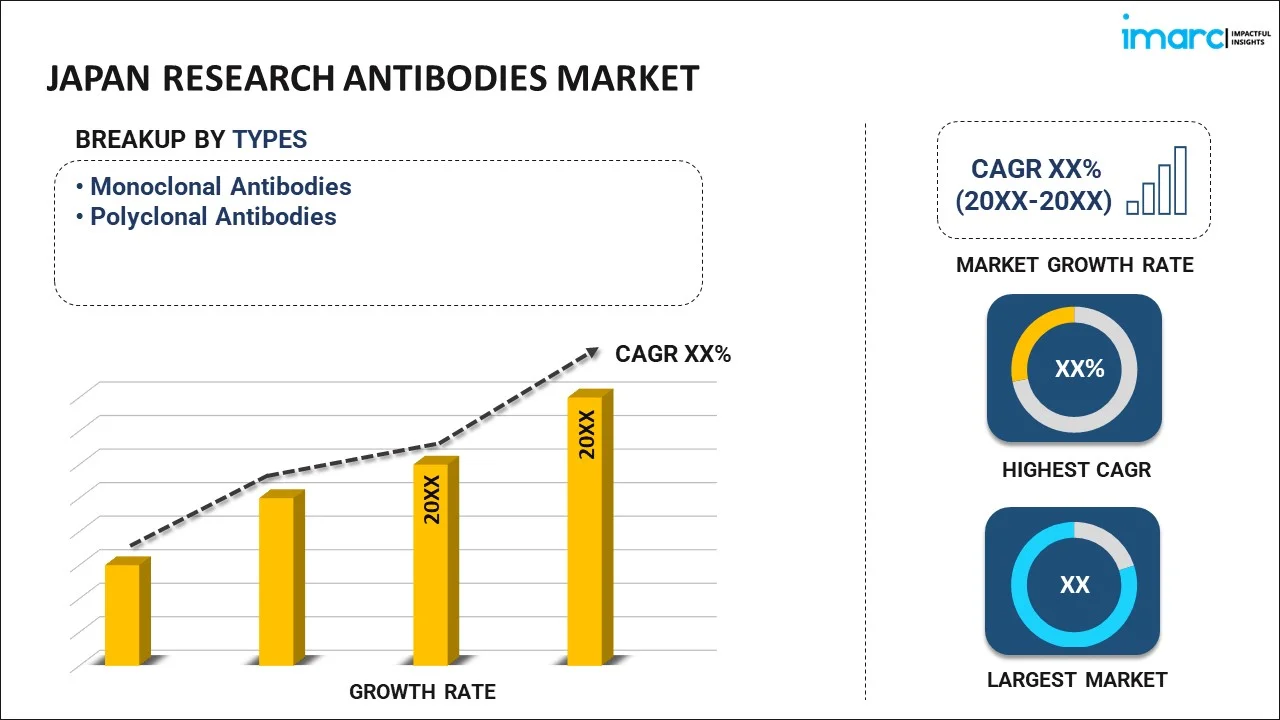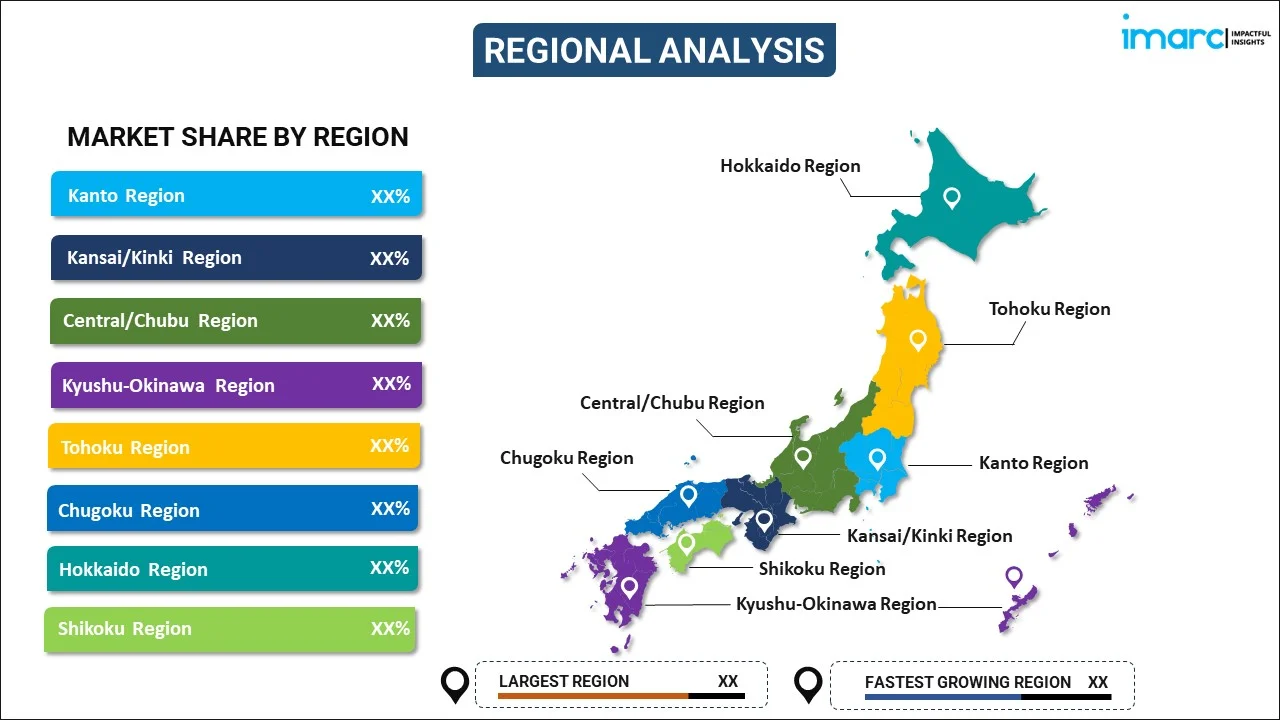
Japan Research Antibodies Market Report by Type (Monoclonal Antibodies, Polyclonal Antibodies), Technology (Immunochemistry, Immunofluorescence, Western Blotting, Flow Cytometry, Immunoprecipitation, ELISA, and Others), Source (Mouse Antibodies, Rabbit Antibodies, Goat Antibodies, and Others), Application (Infectious Diseases, Immunology, Oncology, Stem Cells, Neurobiology, and Others), End User (Academic and Research Institutes, Contract Research Organizations, Pharmaceutical and Biotechnology Companies), and Region 2026-2034
Market Overview:
Japan research antibodies market size reached USD 255.6 Million in 2025. Looking forward, IMARC Group expects the market to reach USD 510.9 Million by 2034, exhibiting a growth rate (CAGR) of 8.00% during 2026-2034. Continuous medical advancements, coupled with the expanding biotechnology industry, are primarily driving the market growth.
|
Report Attribute
|
Key Statistics
|
|---|---|
|
Base Year
|
2025
|
|
Forecast Years
|
2026-2034
|
|
Historical Years
|
2020-2025
|
| Market Size in 2025 | USD 255.6 Million |
| Market Forecast in 2034 | USD 510.9 Million |
| Market Growth Rate 2026-2034 | 8.00% |
Access the full market insights report Request Sample
Antibodies, which are glycoproteins, serve as vital constituents of the immune system, and they are present in body fluids. They circulate within the bloodstream and serve as defenders against antigens, which are foreign substances such as viruses and bacteria. Due to their ability to specifically recognize and bind to antigens, antibodies are essential tools in biological research. Consequently, they play a pivotal role in identifying specific cellular components and are crucial in the development of routine diagnostic tests within the research domain. Several common technologies are extensively employed for antibody research, including immunohistochemistry (IHC), immunofluorescence, western blotting, flow cytometry, immunoprecipitation, and enzyme-linked immunosorbent assay (ELISA).
Japan Research Antibodies Market Trends:
The Japan research antibodies market is witnessing substantial growth and significance within the field of life sciences and medical research. This can be attributed to several key factors. Firstly, the country's robust commitment to scientific advancement and innovation has led to increased funding for research and development activities, spurring demand for research antibodies. Additionally, Japan's thriving pharmaceutical and biotechnology industries are driving the usage of high-quality antibodies for drug discovery, development, and diagnostic applications. The evolving healthcare landscape in Japan, marked by an aging population and increasing health concerns, has intensified the demand for antibodies in clinical research and diagnostics. Antibodies play a pivotal role in identifying disease markers and understanding complex biological pathways, contributing to the development of targeted therapies and precision medicine approaches. Furthermore, Japan's emphasis on personalized medicine and its growing significance in cancer research are bolstering the demand for research antibodies tailored to specific patient profiles. This personalized approach holds immense potential for improving treatment outcomes. The Japan research antibodies market encompasses a wide range of applications, including immunohistochemistry, flow cytometry, ELISA, and western blotting. With a strong foundation in scientific excellence, increasing research activities, and a commitment to cutting-edge medical advancements, the regional market is expected to catalyze in the coming years.
Japan Research Antibodies Market Segmentation:
IMARC Group provides an analysis of the key trends in each segment of the market, along with forecasts at the country level for 2026-2034. Our report has categorized the market based on type, technology, source, application, and end user.
Type Insights:

To get detailed segment analysis of this market Request Sample
- Monoclonal Antibodies
- Polyclonal Antibodies
The report has provided a detailed breakup and analysis of the market based on the type. This includes monoclonal antibodies and polyclonal antibodies.
Technology Insights:
- Immunochemistry
- Immunofluorescence
- Western Blotting
- Flow Cytometry
- Immunoprecipitation
- ELISA
- Others
A detailed breakup and analysis of the market based on the technology have also been provided in the report. This includes immunochemistry, immunofluorescence, western blotting, flow cytometry, immunoprecipitation, ELISA, and others.
Source Insights:
- Mouse Antibodies
- Rabbit Antibodies
- Goat Antibodies
- Others
The report has provided a detailed breakup and analysis of the market based on the source. This includes mouse antibodies, rabbit antibodies, goat antibodies, and others.
Application Insights:
- Infectious Diseases
- Immunology
- Oncology
- Stem Cells
- Neurobiology
- Others
A detailed breakup and analysis of the market based on the application have also been provided in the report. This includes infectious diseases, immunology, oncology, stem cells, neurobiology, and others.
End User Insights:
- Academic and Research Institutes
- Contract Research Organizations
- Pharmaceutical and Biotechnology Companies
The report has provided a detailed breakup and analysis of the market based on the end user. This includes academic and research institutes, contract research organizations, and pharmaceutical and biotechnology companies.
Regional Insights:

To get detailed regional analysis of this market Request Sample
- Kanto Region
- Kansai/Kinki Region
- Central/ Chubu Region
- Kyushu-Okinawa Region
- Tohoku Region
- Chugoku Region
- Hokkaido Region
- Shikoku Region
The report has also provided a comprehensive analysis of all the major regional markets, which include Kanto Region, Kansai/Kinki Region, Central/ Chubu Region, Kyushu-Okinawa Region, Tohoku Region, Chugoku Region, Hokkaido Region, and Shikoku Region.
Competitive Landscape:
The market research report has also provided a comprehensive analysis of the competitive landscape in the market. Competitive analysis such as market structure, key player positioning, top winning strategies, competitive dashboard, and company evaluation quadrant has been covered in the report. Also, detailed profiles of all major companies have been provided.
Japan Research Antibodies Market Report Coverage:
| Report Features | Details |
|---|---|
| Base Year of the Analysis | 2025 |
| Historical Period | 2020-2025 |
| Forecast Period | 2026-2034 |
| Units | Million USD |
| Scope of the Report | Exploration of Historical and Forecast Trends, Industry Catalysts and Challenges, Segment-Wise Historical and Predictive Market Assessment:
|
| Types Covered | Monoclonal Antibodies, Polyclonal Antibodies |
| Technologies Covered | Immunochemistry, Immunofluorescence, Western Blotting, Flow Cytometry, Immunoprecipitation, ELISA, Others |
| Sources Covered | Mouse Antibodies, Rabbit Antibodies, Goat Antibodies, Others |
| Applications Covered | Infectious Diseases, Immunology, Oncology, Stem Cells, Neurobiology, Others |
| End Users Covered | Academic and Research Institutes, Contract Research Organizations, Pharmaceutical and Biotechnology Companies |
| Regions Covered | Kanto Region, Kansai/Kinki Region, Central/ Chubu Region, Kyushu-Okinawa Region, Tohoku Region, Chugoku Region, Hokkaido Region, Shikoku Region |
| Customization Scope | 10% Free Customization |
| Post-Sale Analyst Support | 10-12 Weeks |
| Delivery Format | PDF and Excel through Email (We can also provide the editable version of the report in PPT/Word format on special request) |
Key Questions Answered in This Report:
- How has the Japan research antibodies market performed so far and how will it perform in the coming years?
- What has been the impact of COVID-19 on the Japan research antibodies market?
- What is the breakup of the Japan research antibodies market on the basis of type?
- What is the breakup of the Japan research antibodies market on the basis of technology?
- What is the breakup of the Japan research antibodies market on the basis of source?
- What is the breakup of the Japan research antibodies market on the basis of application?
- What is the breakup of the Japan research antibodies market on the basis of end user?
- What are the various stages in the value chain of the Japan research antibodies market?
- What are the key driving factors and challenges in the Japan research antibodies?
- What is the structure of the Japan research antibodies market and who are the key players?
- What is the degree of competition in the Japan research antibodies market?
Key Benefits for Stakeholders:
- IMARC’s industry report offers a comprehensive quantitative analysis of various market segments, historical and current market trends, market forecasts, and dynamics of the Japan research antibodies market from 2020-2034.
- The research report provides the latest information on the market drivers, challenges, and opportunities in the Japan research antibodies market.
- Porter's five forces analysis assist stakeholders in assessing the impact of new entrants, competitive rivalry, supplier power, buyer power, and the threat of substitution. It helps stakeholders to analyze the level of competition within the Japan research antibodies industry and its attractiveness.
- Competitive landscape allows stakeholders to understand their competitive environment and provides an insight into the current positions of key players in the market.
Need more help?
- Speak to our experienced analysts for insights on the current market scenarios.
- Include additional segments and countries to customize the report as per your requirement.
- Gain an unparalleled competitive advantage in your domain by understanding how to utilize the report and positively impacting your operations and revenue.
- For further assistance, please connect with our analysts.
 Request Customization
Request Customization
 Speak to an Analyst
Speak to an Analyst
 Request Brochure
Request Brochure
 Inquire Before Buying
Inquire Before Buying




.webp)




.webp)












